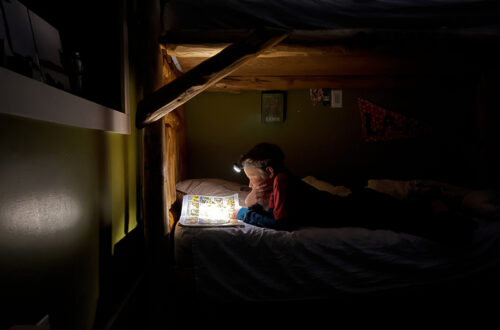A culture of narrative deprivation
I heard this phrase on this story on NPR this morning, in which Yale graphic design critic Jessica Helfand discusses our “patterns of consumption” of media. Basically she critiques the short attention span and the way it cultivates the “impatience with which people have come to expect everything to be delivered to them,” an impatience Helfland characterizes as “terrifying.”
For a person whose blog tagline claims the world is made up of stories, not atoms, this opens up some intriguing questions.
Can you have a story without patience? The act of reading insists on certain qualities of character, including patience and a kind of submission to the terms and pacing of a book. There is also a submission to the capabilities of the human mind — one can only read so fast, and absorbing it demands reflection as well. That’s partly why reading is such a humanizing activity.
If we are supplied with increasingly instantaneous forms of media to consume, are we sabotaging our humanity at some level? Are we flattening out our ability to experience the richness of our own lives?
Listening to the official discourse about education in this country, you’d think the humanities didn’t exist. The emphasis is always on finding more funding to improve the teaching of math, science and technology. What a contrast to the dismissive attitude toward the arts and literature — an attitude expressed tellingly earlier this week with the release of a study exulting that a majority of the Facebook generation read a book over the last year. As if a single book means we’re “reading strong.” It was music to my ears to hear someone taking up the subject of narrative.



12 Comments
Jacqueline Hudak
I, too heard that story while puttering in my kitchen this morning. As a Family Therapist with a narrative lens, I am always interested in how story shapes our lives. So, I googled “narrative deprivation” and found your blog. I will visit again!
Janet
Thank you for stopping by! I’ll bet you would bring some very interesting insights to bear on this whole subject.
Mike Norman
I listened to the story on NPR this morning, as well. I was very interested in the concept since I work in religious education, which relies heavily on the narratives of generations (as well as how our own narrative connects with tradition). A young adult that doesn’t have patience for unfolding stories will certainly not have time for the traditional ways that religion was passed on and I believe our increased need for things quickly will even cause most people to look for a “quick fix” spirituality – it’s only good if it grabs me immediately and impacts me just on the surface level. No matter how we feel about religion it’s interesting how this concept of narrative deprivation will impact our beliefs. I believe it also increases the need for “make my religion black and white” so I can “get it” quickly and move on – which could be tied to the draw of fundamentalism. Just a thought. I hope to hear more about narrative deprivation in the future!
Janet
Yes, I agree. Very interesting (and sobering) points about the ways our meaning-making habits can influence our ability to seek answers to some of our deepest questions.
DC
i think this is an interesting and important topic for discussion. i was glad to see you take it on just after i heard the NPR story as well. how will it affect us and how relevant is this “narrative deprivation”?
Janet
Thanks for stopping by, DC!
David Boje
Hi Muriel,
I enjoyed your post. I want to discuss two points.
First point. Walter Benjamin (1936) wrote a wonderful essay about the death of storytelling, that it was coming to an end. For some similar reasons, because the dominant narrative order is aobut information, about the form structure and code of the narrative, not about how to interpret and understand or to tell the fine nuances of what my colleagues and I call ‘living story’ the kind that is relational, connecting to more living stories, your own and others.
The second point. Your slogan: “The world is made up of stories not atoms.” This speaks to the age old debate of idealism and materialism. I have been doing work on ‘quantum storytelling’ and my friend and colleage Anete Strand on ‘material storytelling.’ Where we agree is that the quanta (small stuff than the atom) is intra-active and intra-penetrating with the living story. Indeed we both look at living story as having its own materiality, its own agential way of being living entity. So neither of us looks to story to be just a mind internal representation, some representation or some internalized cognitive sensemaking. Rather the living story has the materiality of history, and the materiality of something selected out of a set of possible futures.
That is probably more than you wanted to know. It has to do with what some communication studies scholars call materiality rhetoric. And in the sense that living stories have an aliveness, there is a materialistic way they intra-penetrate the materiality, that vibrant matter as Jane Bennett calls it, or spacetimemattering as quantum physicist Karen Barad writes about. This is where I am headed, in a difference with Barad, Strand, and Bennett. In quantum storytelling, the future is headed our way, and so it is not the past catching up with us or the infernal present (not a Bergsonian materiality). Rather, as William James the pragmatist argues, material stuff has its storying. The world has a living story, the ways of nature are very telling, in a forensic way, calling out to us living being.
Anyway, enjoyed your post.
David
Janet
Oh dear, I don’t mean to pass myself off as Muriel Rukeyser, the author of my tagline! It resonates with me, but I surely didn’t think of such a pithy, provocative phrase myself.
Your line of study sounds fascinating, and certainly more in-depth than I’ve gone myself. Walter Benjamin’s essay sounds like one I should look for.
Thank you for stopping by and for offering so much to think about.
Sahamamama
Can you have even your own good story without patience? I certainly couldn’t have had mine. When I was “still single” at 36, stories of people who waited for good things strengthened me and gave me hope. Thirty-seven brought along a wonderful husband, thirty-eight a beautiful daughter, thirty-nine battled cancer, and forty welcomed adorable twin daughters.
Can we know what it means to be blessed, without a storyline? Can we know what we truly value, without a story?
As my husband and I were discussing our vision for the next several years of homeschooling, it became clear to us that we would read aloud, share stories from our own lives, listen to audiobooks, and read some more. Great stories are humanizing.
Just today we finished reading Heidi. Two things happened that reveal how much this story touched the girls’ hearts. When I mentioned that this was the last part of the final chapter, they expressed sadness. “I’m going to miss the Grandfather.” Or, “I’m going to miss Heidi, the Grandmamma, and the goats.” Then, when the final sentence was read, they clapped and cheered. “Hooray! We LOVE that story! Can we ever read it again?”
At times, I do feel the pressure to “focus on STEM.” It’s trendy now, isn’t it? ;) I’ve even read articles in which the experts say Kindergarteners should learn engineering. Now, we do study Math and Science, but these are not our primary focus.
Instead, we read stories. Greek myths and Norse myths. Bible stories. Aesop’s fables. Fairy tales and folk tales. Nursery rhymes and lullabies. Poetry. Chapter books. Picture books. Historical narratives. Shakespeare adapted for children. We listen to audiobooks, including Your Story Hour and Great Hall Productions. The girls’ heads and hearts are full of beautiful stories. When they play, they “play Narnia” or they “play Mary Poppins” or they “play Caddie Woodlawn.” Complete with costumes from the box, and (sometimes) British accents from the audiobooks. :)
I once read an article in which a noted teaching surgeon lamented the lack of hands-on experience in the newest students he was teaching. He said that years earlier, students had grown up fixing bikes, building with wood, tinkering in the garage, making forts, tying knots at camp, cooking, sewing, doing things with concrete objects with their own hands. Now, the students were coming in without any of these hands-on, first-person experiences. Although many of them were more scientifically sophisticated, they had grown up in a virtual world, without concrete experience of REAL THINGS. His view was that this background hindered them tremendously in the actual DOING of science/medicine, and he recommended that upcoming students go out and tinker in the garage!
Perhaps, instead of an intentional early focus on STEM, it might be better to grow strong in our love of language and story, and to have ample time for hands-on exploration and first-hand observation. BTW, I love your blog! :)
Janet
Thank you!
What a story you have. And what a gift to your children to immerse them in stories in their early years. I nodded all the way through your description of books in your homeschool — our home atmosphere is buzzing with stories as well. I do see literacy — not just being able to read, but being comfortable with the structure and imaginative stimulation of stories — as foundational to the study of other subjects. Facts need to be connected and made meaningful.
The surgeon’s insights are so interesting to me. Much to ponder there.
R. James Brownlow
Like you and many of your respondents, I too heard the NPR broadcast and was immediately intrigued by the phrase “Narrative Deprivation.”
However the message I received may be slightly different. Our challenge in speaking to newer generations may not be to convince them to embrace traditional ways of absorbing information, but rather in changing our ways of delivering content such that its appeal is broad yet not verbose; a mission well within our grasp as evidence by the reaction to a concise phrase “Narrative Deprivation.”
RJB
Janet
“Narrative deprivation” is a succinct, provocative phrase. But plumbing its meaning takes reflection — an activity that requires, it seems, more words.
The thought of a generation that only absorbs content delivered in its own terms is a little disturbing to me. Think what they will miss.